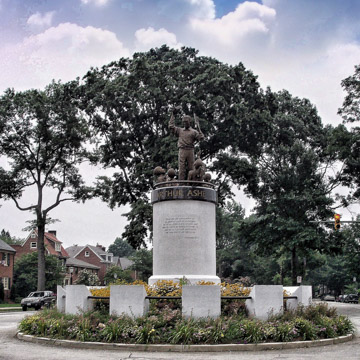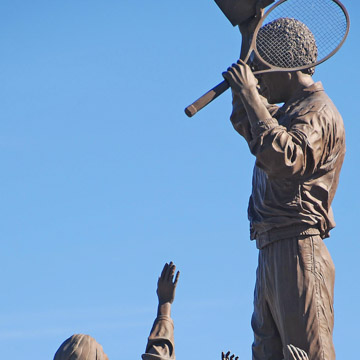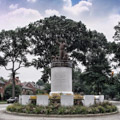This westernmost monument on the Avenue depicts Arthur Ashe, the legendary tennis player and Richmond native, who was the first African American man to win the U.S. Open and Wimbledon. His statue faces west from the intersection at Roseneath Road and he is depicted, according to his wishes, as he appeared towards the end of his life, emaciated from his struggle with AIDS, but still sharing his love of sport and knowledge. Ashe holds aloft a tennis racket in one hand and books in the other, while four children reach up to him from below. When local artist Paul DiPasquale approached Ashe about sculpting him, Ashe himself suggested this composition as an appropriate way to commemorate his legacy of youth empowerment through tennis and education. Though the statue’s quality and composition were much discussed, its location generated the biggest controversy. When DiPasquale finished the statue after Ashe’s death in 1993, it had no predetermined location, but many public officials endorsed a site on Monument Avenue. While some regarded the placement of a statue of a prominent African American amidst those memorializing the Confederacy as a symbol of racial progress, others viewed it as disrespectful to Ashe’s memory that his statue would be sharing public space with racist traitors. At the opposite extreme was the white supremacist argument that it was the monuments to Lee and others that would be disrespected by the presence of Ashe’s statue. The City Council gave final approval in 1995 and the statue was installed in 1996. In the ensuing years, many Richmonders credited the addition of the Ashe Monument as significantly altering the perception of Monument Avenue, turning what former Virginia Governor L. Douglas Wilder called “the living room of the city” into a more inclusive public space. Following the anti-racism protests in 2020, the Ashe Monument remains the only statue on Monument Avenue that is not slated for removal.
You are here
Arthur Ashe Monument
1993–1996, Paul DiPasquale, sculptor; Barry Starke, base. Intersection of Roseneath Rd. and Monument Ave.
Updated By:
Richard Guy Wilson (2020)
If SAH Archipedia has been useful to you, please consider supporting it.
SAH Archipedia tells the story of the United States through its buildings, landscapes, and cities. This freely available resource empowers the public with authoritative knowledge that deepens their understanding and appreciation of the built environment. But the Society of Architectural Historians, which created SAH Archipedia with University of Virginia Press, needs your support to maintain the high-caliber research, writing, photography, cartography, editing, design, and programming that make SAH Archipedia a trusted online resource available to all who value the history of place, heritage tourism, and learning.























